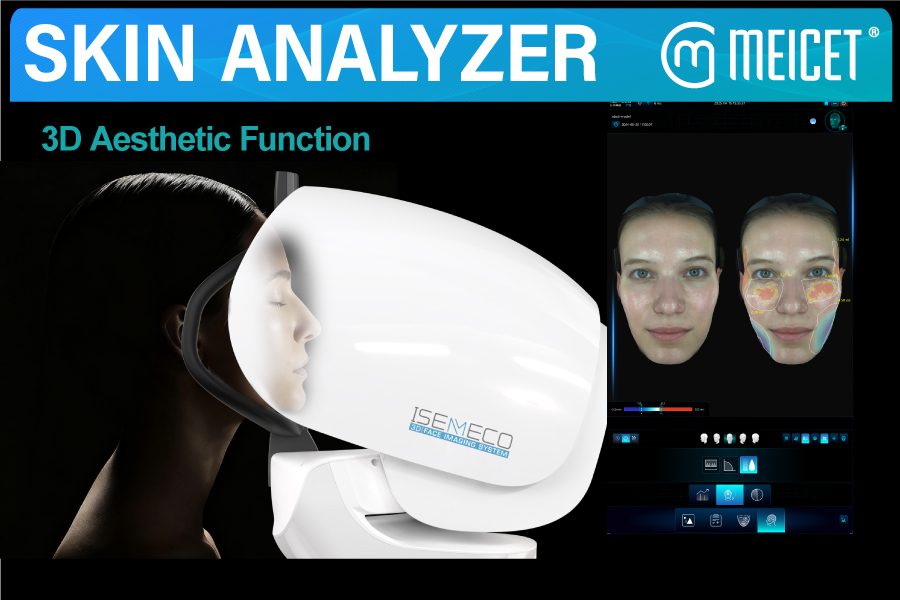In the rapidly evolving skincare industry, AI-powered skin analysis instruments have emerged as game-changing tools, transforming how professionals diagnose skin conditions and recommend personalized treatments. These advanced devices combine cutting-edge imaging technologies with sophisticated artificial intelligence algorithms to provide unprecedented insights into skin health beyond what the naked eye can perceive.
The Transformative Role of AI in Skin Analysis
Traditional skin diagnosis primarily relied on visual inspection and practitioner experience, often missing subtle early signs of skin issues. Modern AI skin analysis systems have revolutionized this process through several key technological advancements:
Multi-spectral imaging allows these instruments to penetrate different skin layers using various light wavelengths, revealing hidden concerns like subcutaneous pigmentation and early inflammation that are not visible on the surface. High-resolution cameras capture skin textures at microscopic levels, enabling detailed analysis of pores, fine lines, and skin topography. Most importantly, AI-powered deep learning algorithms process these images through neural networks trained on vast datasets of skin images, allowing for precise quantification of various skin parameters and accurate assessment of conditions like wrinkles, pigmentation, porosity, and vascular issues.
This technological synergy enables skincare professionals to move from subjective visual assessment to data-driven diagnosis, creating personalized treatment plans with measurable outcomes and trackable progress over time.
Leading AI Skin Analysis Instruments in the Market
Several innovative companies have developed standout AI-powered skin analysis systems that are currently making waves in the skincare industry:
MEICET Skin Analyzer 3D D9
The MEICET 3D D9 represents the cutting edge in skin analysis technology, incorporating several groundbreaking features that set it apart in the competitive marketplace. This sophisticated instrument utilizes binocular grating structured light combined with a dedicated 3D imaging system to capture the entire face with 36 million effective pixels, producing ultra-high definition spectral images that reveal even the most subtle skin concerns.
The D9′s 0.2mm high-precision 3D full-face imaging modeling capability is enhanced by a 0.1mm high-precision fully automatic external scanning device that captures 180-degree facial images in a single shot without requiring multiple position adjustments. This streamlined process significantly improves both the practitioner’s efficiency and the client’s experience.
For aging analysis, the D9 incorporates a professional aging grade assessment system based on the “Human Skin Aging Evaluation Standard” officially released by the Chinese Anti-Aging Promotion Association. The system analyzes wrinkles in seven facial areas—forehead lines, frown lines, interocular lines, crow’s feet, periorbital lines, nasolabial folds, and mouth corner lines—categorizing them into four depth grades (skin lines, fine wrinkles, moderate wrinkles, and deep wrinkles). Using AI deep learning, it calculates aging levels from 0 (no wrinkles) to 8 (most severe wrinkles) across nine grades. A similar grading system applies to pigment changes, focusing specifically on brown spots.
The D9 also features innovative AIGC aging simulation technology that uses generative AI algorithms to create predictive images showing how skin may appear from ages 20 to 80+, helping users understand their potential aging trajectory and the importance of preventive interventions.
From a practical standpoint, the MEICET D9 offers comprehensive data management capabilities, seamlessly integrating with mainstream SaaS systems including Linkedcare, Lanshi, Fangrui, Ruimeiyun, Hongmai, and Meilaike. This interoperability allows clinics to avoid duplicate profiling while ensuring imaging data is accessible across platforms, supporting precise marketing strategies and enabling multi-terminal access via iPads, computers, and other devices.
Other Notable AI Skin Analysis Instruments
Meitu Eve
This pioneering system utilizes three built-in high-definition professional cameras to create 3D facial images with 12-megapixel resolution, covering 98% of the face in a single shot. Its AI technology analyzes across 10 major dimensions and generates easily understandable visual reports that help bridge the communication gap between professionals and clients.
Moji Skin Detector PLUS
Designed for both professional and home use, this device employs a dual-light source imaging system (UV + VIS) to accurately identify 12 skin indicators including pores, spots, fine lines, and sebum distribution. Its AI engine is trained on over 100,000 real skin samples specifically from Chinese women aged 25-45, making it particularly relevant for this demographic.
SkinRun V3
This intelligent skin testing instrument uses a three-spectrum image acquisition system (daylight, polarized light, and UV light) along with 20-megapixel high-definition pixels to analyze facial skin conditions scientifically. Its AI face recognition technology identifies and locates facial features with precision while connecting to a larger cloud-based data platform for enhanced analysis.
La Mer’s Balanced Skin Analysis
This virtual skin analysis tool leverages AI diagnostic technology that assesses over 200 facial measurements and 20 primary skin conditions. Focusing on three key parameters—skin tone, sensitivity, and structure—it provides personalized skincare routines based on scientific analysis.
The Future of AI in Skin Analysis
The integration of AI technology into skin analysis instruments represents a fundamental shift from reactive skincare to preventive and personalized approaches. As these systems continue to evolve with larger training datasets and more sophisticated algorithms, their diagnostic accuracy and predictive capabilities will further improve.
The MEICET 3D D9 exemplifies this future direction, combining comprehensive imaging capabilities with advanced AI analytics to provide both practitioners and clients with unprecedented insights into skin health. Its ability to quantify aging processes, simulate future skin conditions, and track subtle changes over time makes it an invaluable tool for modern skincare practices looking to deliver truly personalized treatment experiences.
These technological advancements are transforming skincare from an artisanal practice to an evidence-based science, enabling more accurate diagnoses, more effective treatments, and ultimately, better outcomes for consumers seeking to maintain healthy, youthful-looking skin throughout their lives.
by Irina
Post time: Sep-25-2025










